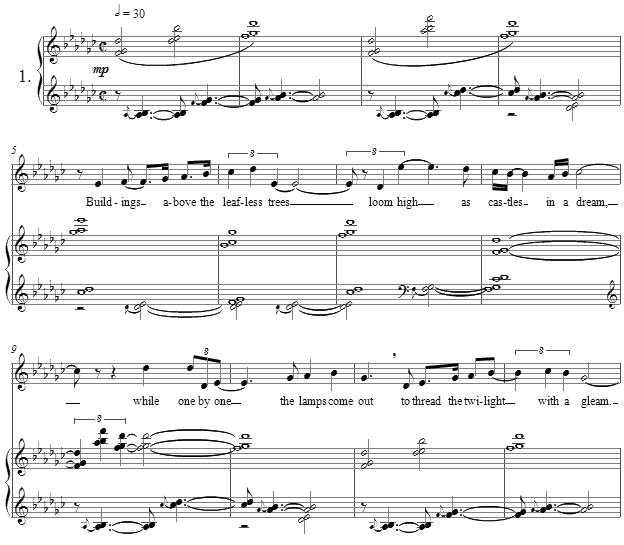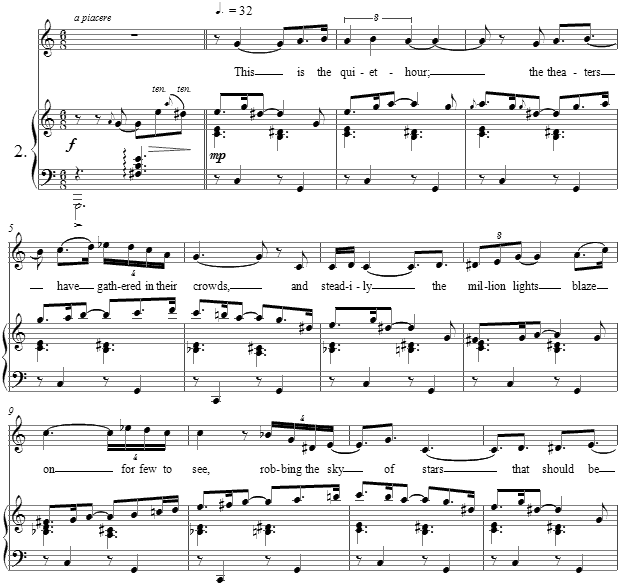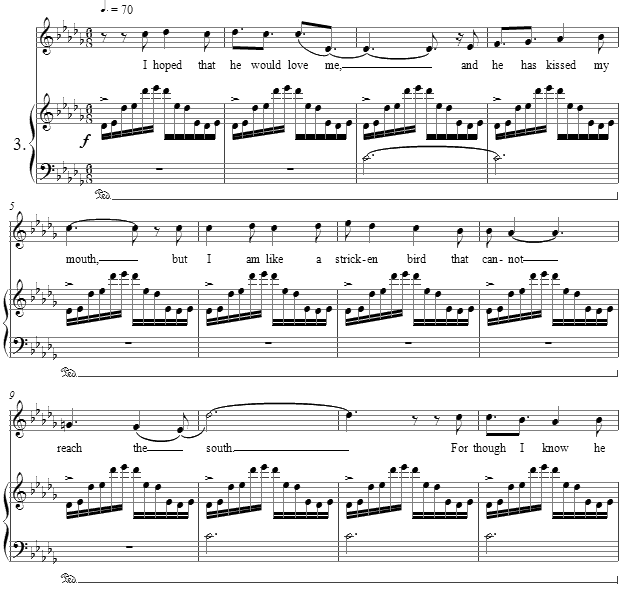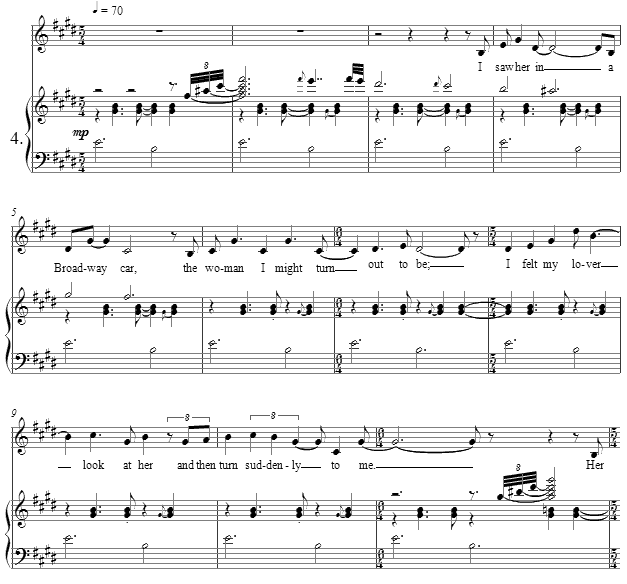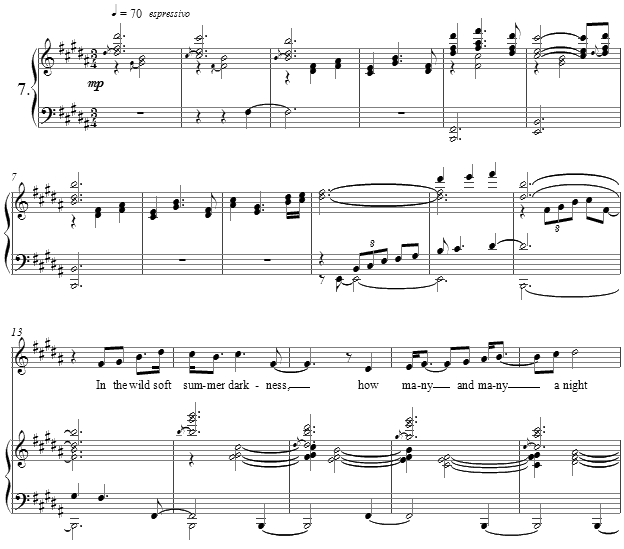Music and Texts of GARY BACHLUND
Vocal Music | Piano | Organ | Chamber Music | Orchestral | Articles and Commentary | Poems and Stories | Miscellany | FAQs
New York Sorrows - (2007)
Sara Teasdale
Seven songs for mezzo soprano and piano
i. Central Park at Dusk [ 2 pages, circa 2' 05" ]
Buildings above the leafless trees
Loom high as castles in a dream,
While one by one the lamps come out
To thread the twilight with a gleam.
There is no sign of leaf or bud,
A hush is over everything--
Silent as women wait for love,
The world is waiting for the spring.
ii. Broadway [ 4 pages, circa 4' 00" ]
This is the quiet hour; the theaters
Have gathered in their crowds, and steadily
The million lights blaze on for few to see,
Robbing the sky of stars that should be hers.
A woman waits with bag and shabby furs,
A somber man drifts by, and only we
Pass up the street unwearied, warm and free,
For over us the olden magic stirs.
Beneath the liquid splendor of the lights
We live a little ere the charm is spent;
This night is ours, of all the golden nights,
The pavement an enchanted palace floor,
And Youth the player on the viol, who sent
A strain of music through an open door.
iii. The Kiss [ 2 pages, circa 1' 00" ]
I hoped that he would love me,
And he has kissed my mouth,
But I am like a stricken bird
That cannot reach the south.
For though I know he loves me,
To-night my heart is sad;
His kiss was not so wonderful
As all the dreams I had.
iv. The Old Maid [ 3 pages, circa 3' 20" ]
I saw her in a Broadway car,
The woman I might grow to be;
I felt my lover look at her
And then turn suddenly to me.
Her hair was dull and drew no light,
And yet its color was as mine;
Her eyes were strangely like my eyes,
Tho' love had never made them shine.
Her body was a thing grown thin,
Hungry for love that never came;
Her soul was frozen in the dark,
Unwarmed forever by love's flame.
I felt my lover look at her
And then turn suddenly to me --
His eyes were magic to defy
The woman I shall never be.
v. Coney Island [ 3 pages, circa 4' 05" ]
Why did you bring me here?
The sand is white with snow,
Over the wooden domes
The winter sea-winds blow--
There is no shelter near,
Come, let us go.
With foam of icy lace
The sea creeps up the sand,
The wind is like a hand
That strikes us in the face.
Doors that June set a-swing
Are bolted long ago;
We try them uselessly--
Alas there cannot be
For us a second spring;
Come, let us go.
vi. Less than the cloud to the wind [ 2 pages, circa 1' 20" ]
Less than the cloud to the wind,
Less than the foam to the sea,
Less than the rose to the storm,
Am I to thee.
More than the star to the night,
More than the rain to the tree,
More than heaven to earth
Art thou to me.
vii. Summer Night, Riverside [ 4 pages, circa 4' 00" ]
In the wild soft summer darkness
How many and many a night we two together
Sat in the park and watched the Hudson
Wearing her lights like golden spangles
Glinting on black satin.
The rail along the curving pathway
Was low in a happy place to let us cross,
And down the hill a tree that dripped with bloom
Sheltered us,
While your kisses and the flowers,
Falling, falling,
Tangled in my hair. . . .
The frail white stars moved slowly over the sky.
And now, far off
In the fragrant darkness
The tree is tremulous again with bloom
For June comes back.
To-night what girl
Dreamily before her mirror shakes from her hair
This year's blossoms, clinging to its coils?[ 20 pages, circa 19' 05" ]
Sara Teasdale
Sara Teasdale (1884-1933) was an American lyrical poet, born Sarah Trevor Teasdale in St. Louis, Missouri. Her major themes were love, nature's beauty, and death, and her poems were much loved during the early 20th century. In 1918 she won the Columbia University Poetry Society prize (the forerunner of the Pulitzer Prize for Poetry) and the annual prize of the Poetry Society of America for her volume, Love Songs.
Throughout her life, Teasdale suffered poor health and it was not until she was nine years old that she was seen healthy enough to begin her education at a private school. In 1898 she attended Mary Institute, and the following year she enrolled in Hosmer Hall, from which she graduated in 1903. Her influences included the British poet, Christina Rossetti, and Teasdale made numerous trips to Europe, beginning in 1905. In 1913, Teasdale was courted by two admirers. The poet Vachel Lindsay fell in love with her and at one point was sending her long, fantastic love letters on a daily basis expressing his true love. After that, he asked her to marry him, but though she had deep feelings for Vachel, she instead married Ernst Filsinger, a wealthy businessman in 1914 when she was thirty years old. The following year they moved to New York City, which became her home for the rest of her life. Teasdale and Lindsay remained fond but platonic friends throughout their lives, and Lindsay said that she was his life's "most inspiring, most satisfying friend."
Teasdale was very much a product of her Victorian upbringing, and she was never able to experience in life the passion that she expressed in her poetry. She was not happy in her marriage, and she divorced Filsinger in 1929, against his wishes. Teasdale's health further declined. In 1931, two years before Teasdale's suicide attempt, Vachel Lindsay had also committed suicide. In 1933 in her New York City apartment, Teasdale took an overdose of sleeping pills and died in her bath. Her last, and some say her finest, collection of verse, Strange Victory, was published posthumously that same year. She is buried in the Bellefontaine Cemetery in St. Louis.
The first setting centers on parallel seconds, individually and as components of chords. While gentle and lyrical, the seeming romance is underpinned by the pleasantly unrelieved dissonance.
The second setting tells a tale of that "quiet hour" when lively Broadway turns more quiet. A slow jazzy texture underscores the remembrance of a romantic time now past, as "over us the olden magic stirs." Thoughts of these sense memories are bittersweet as the harmonic setting never fully settles on the "blue notes" or more normal diatonic direction of the style, but rather is suspended between the two.
The third setting is the angry confession that "dreams" are not being fulfilled in loving and being loved. The repetitive seconds return from the opening, this time with a aggressive vengeance across three octaves.
As these texts speak of the 1920s' era, this next setting telling of the "old maid" twists a simple gesture from that time into a quintuple meter and lays over it polytonal commentary. The resulting seconds unify this with previous settings, and hint that the speaker telling of the "old maid" will likely end up much like this individual, in spite of the assertion that this will "never be."
Additional settings of Teasdale's text continue the "sorrowful" tale, until the final lyrical remembrance of a summer night at the riverside, meaning by the Hudson river. The last lines inform us of the nostalgia as the images, now past, are being replayed for other lovers as is the old and recurring tale of romance and lost love. This ends the seven song cycle which I choose therefore to call "New York Sorrows," as I imagined these poems to be quite autobiographical and sweetly yet sadly gray in tone.
The score for New York Sorrows is available as a free PDF download, though any major commercial performance or recording of the work is prohibited without prior arrangement with the composer. Click on the graphic below for this piano-vocal score.

